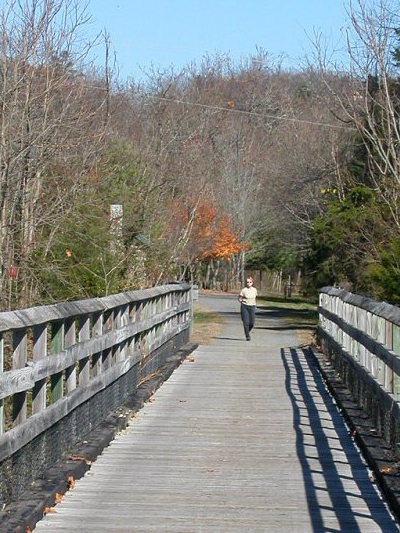
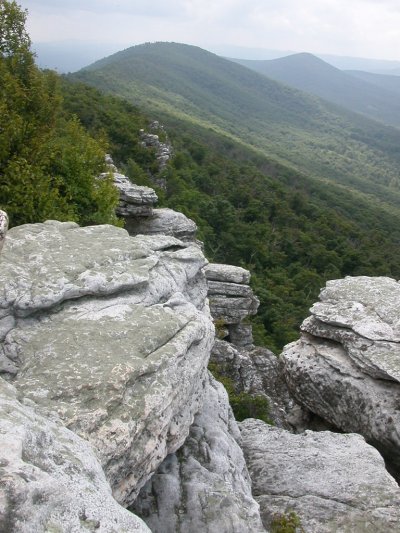
New River Trail (Wythe County) and Big Schloss (Shenandoah County)


New River Trail (Wythe County) and Big Schloss (Shenandoah County)
Course Objectives
This course will explore Virginia primarily through place-based stories. We will discover the “why of where,” how sites have evolved to become distinctive and how individuals can shape the future of different places. You will develop the ability to apply geographic expertise in making economic and political choices, no matter where you live.
The class has been redesigned substantially since last taught in 2016. Contemporary (“ripped-from-the-headlines”) issues will be highlighted, including the November 2019 elections, sea level rise, natural gas fracking and pipelines, recruiting an NBA or NHL professional team to Hampton Roads, expanding Metrorail to Prince William County, and relocating Confederate monuments. Geographical knowledge can be applied to current challenges and opportunities.
Historical context will illuminate how the development of transportation networks and land use planning has created today’s traffic congestion. You will know why population in Southwest Virginia is declining, Northern Virginia is growing, and how public policies can alter where people choose to live, work, and play.
This is a hybrid class. Most instructional material will be online, including web pages, videos, StoryMaps, podcasts and blog posts. In-person classes every other week will emphasize interactive discussion of material rather than lectures by the instructor.
We will use technology, but this class does not require any skill with Geographic Information Systems (GIS) technology. We will use a range of online tools such as GoogleMaps, The National Map from the US Geological Survey, the Newberry Library’s Atlas of Historical County Boundaries, and interactive maps such as those provided by the Census Bureau and the Virginia Department of Mines, Minerals and Energy.
At the end of the semester, you will be familiar with key maps, facts/myths, current issues, trends, and multiple sources of Virginia-related data for future application in other classes. You will even be able to entertain family and friends in the car by commenting when you drive by different places in Virginia, “hey, did you know that…”
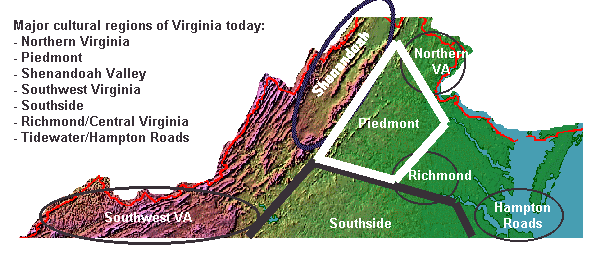
Instructional Material
There is no required textbook. Detailed content for each class will be posted online at the VirginiaPlaces website.
Key Dates (as planned for 2019...):
Monday, August 26 – First day of class, 1:30-2:45pm (class meets every other week)
Monday, September 8 – Submit planned site for Field Trips and Portfolio for approval, by midnight
Sunday. September 15 – First Guided Tour, 1:00-4:00pm (optional, extra credit)
Friday, September 20 – Last day to submit report on First Guided Tour for extra credit
Monday, September 16 – submit Exam #1 and Field Trip Report #1 by midnight
Monday, September 30 – submit Exam #2 and Field Trip Report #2 by midnight
Saturday, October 5 – Second Guided Tour, 9:00-noon (optional, extra credit)
Friday, October 11 – Last day to submit report on Second Guided Tour for extra credit
Monday, October 14 – submit Exam #3 and Field Trip Report #3 by midnight
Monday, October 28 – submit Exam #4 and Field Trip Report #4 by midnight
Saturday, November 2 – Third Guided Tour, 9:00-noon (optional, extra credit)
Friday, November 8 – Last day to submit report on Second Guided Tour for extra credit
Monday, November 11 – submit Exam #4 and Field Trip Report #4 by midnight
Monday, November 18 - Virtual Tour submission due by midnight
Monday, November 25 – submit Exam #4 and Field Trip Report #4 by midnight
Monday, November 25 –Last day to submit museum/public meeting reports for extra credit
Monday, December 2 – Last day of class, 1:30-2:45pm
Monday, December 2 – Final Portfolio due by midnight
Monday, December 16 – Final Exam due by midnight
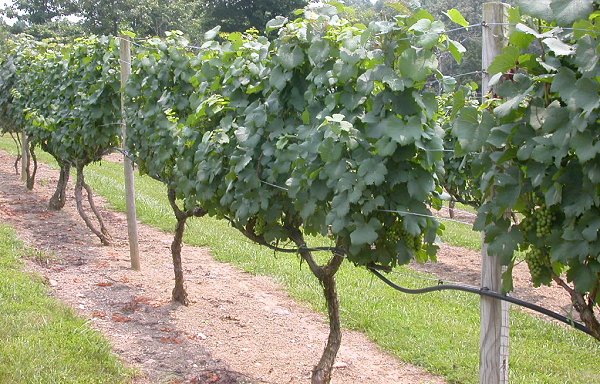
vineyard at the Tomahawk Winery (Pittsylvania County)
Late Policy:
All material must be submitted by the assigned dates.
Honor Code:
All assignments and exams are open book. You may consult any resource you wish other than asking another person for assistance. All work must be done on your own. All students at GMU are governed by the provisions of the honor code, as given in the catalog.
Weekly Schedule of Study:
Material is assigned each week. Starting on September 9, in-person classes will emphasize the material assigned for the previous two weeks, but discussion will also incorporate all previous material. More details regarding the content for each week will be provided at http://www.virginiaplaces.org/ggs380/ The following provides an outline of the areas to be emphasized
Week Starting Monday, August 26
Northern Virginia
objectives for class [to be added]
Readings and Assignments[to be added]
Week Starting Monday, September 2
Places ‘n Spaces (Boundaries and Regions)
objectives for class [to be added]
Readings and Assignments[to be added]
Week Starting Monday, September 9
Rocks ‘n Rivers (Geology and Hydrology)
objectives for class [to be added]
Readings and Assignments[to be added]
Week Starting Monday, September 16
Virginia, Naturally (Environment and Climate)
objectives for class [to be added]
Readings and Assignments[to be added]
Week Starting Monday, September 23
“First Families of Virginia” (FFV’s): Native and Colonial
objectives for class [to be added]
Readings and Assignments[to be added]
Week Starting Monday, September 30
Chesapeake Bay and Tidewater
objectives for class [to be added]
Readings and Assignments[to be added]
Week Starting Monday, October 7
Transportation in Virginia: Roads, Rails, Even A Spaceport
objectives for class [to be added]
Readings and Assignments[to be added]
Week Starting Monday, October 14
Why They Fought Where They Fought: Military Geography
objectives for class [to be added]
Readings and Assignments[to be added]
Week Starting Monday, October 21
Agriculture and Aquaculture
objectives for class [to be added]
Readings and Assignments[to be added]
Week Starting Monday, October 28
Government and Politics
objectives for class [to be added]
Readings and Assignments[to be added]
Week Starting Monday, November 4
"Ugh, Where Does It Go When We Flush?"
objectives for class [to be added]
Readings and Assignments[to be added]
Week Starting Monday, November 11
From Firewood to Solar: Energy in Virginia
objectives for class [to be added]
Readings and Assignments[to be added]
Week Starting Monday, November 18
Telling Tourists Where to Go (Parks and Protected Places)
objectives for class [to be added]
Readings and Assignments[to be added]
Week Starting Monday, November 25
Southwestern Virginia
objectives for class [to be added]
Readings and Assignments[to be added]
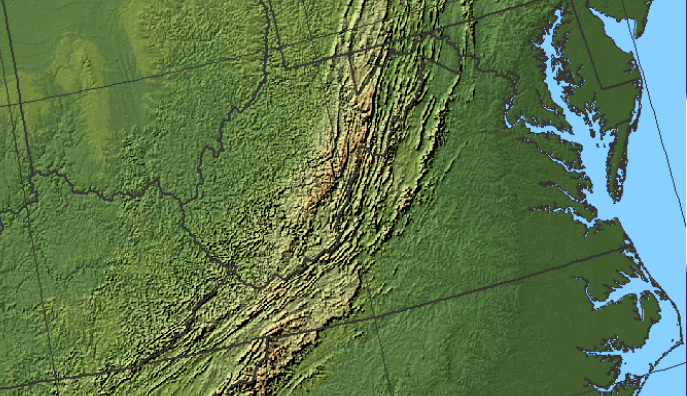
can you identify the Piedmont - between the Coastal Plain and Blue Ridge?
Source: National Atlas
Grading:
Your grade will be based entirely on your point total.
A+ 966-1,000 points
A 933-965 points
A- 901-932 points
Blackboard may show you percentages as well as points for online exams. Ignore the percentages; they are irrelevant. Count the total points you have earned; they are what determines your grade.
Points can be earned by:
6 Online Exams (70pts each, top 5 count) - Total: 350 points
7 In-Class Quizzes (50pts each, top 5 count) - Total: 250 points
6 On-Your-Own Field Trip Reports (20 points each, top 5 count) - Total: 100 points
Virtual Tour - Total: 50 points
Identify Proposed Site for Field Trips/Portfolio - Total: 10 points
Final Portfolio - Total: 100 points
Final Exam - Total: 140 points
Total - 1,000 points
Extra Credit Opportunities (200 pts, 20% of final grade)
3 Guided Tour Reports (50 points each) - Total: 150 points
5 Museum/Historic Site Reports (10 points each) - Total: 50 points
Total possible points - 1,200 points
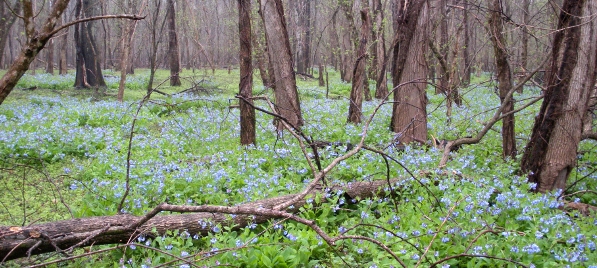
Virginia Bluebells, at Merrimac Farm Wildlife Management Area (Prince William County)
(Prince William County)
Online Exams:
Online Exams will be posted on Blackboard on Friday and are due by midnight the following Monday. Online Exams are open book. Use whatever maps, books, websites, etc. you wish, but no help can be obtained from another person. (There is no lifeline where you can text a buddy and ask “Hey, do you know…)
Expect to see a variety of questions types, including multiple choice, matching, and short essays. Critical thinking and analytical skills will be required, since simplistic questions such as “How many people live in Richmond?” can be answered with a simple Google search.
Online Exams are cumulative. Material covered earlier in the semester may appear in questions on all exams.
Six exams will be posted on a Friday and are due by midnight on the following Monday. Each Online Exam is worth up to 70 points. The lowest grade will be discarded, and the top five grades will count towards your final grade.

constructing the Silver Line at Tysons Corner, September 2011 (Fairfax County)
In-Class Quizzes:
In-Class quizzes will be used each week, starting September 9 through December 2. Format of exam may vary, based on technology available in classroom.
In-Class Quizzes are also open book, but available time will be very limited. To complete the quizzes, you will have to rely upon what you have learned to answer questions. Like the Online Exams, In-Class Quizzes will be cumulative. Material covered earlier in the semester may appear in questions on all quizzes.
Consider the In-Class Quiz questions as comparable to your boss asking a question when the two of you enter an elevator, and you have to produce a quick and appropriate response without time to search the internet.
You are not required to come to classes, but they offer the only opportunity to complete In-Class Quizzes that are worth 25% of the total grade.
There will be seven In-Class Quizzes. Each In-Class Quiz is worth up to 50 points. The lowest two grades will be discarded, and the top five grades will count towards your final grade.
Identify Proposed Site for Field Trips/Portfolio:
You will select one spot within Virginia to examine in depth throughout the semester. Pick a location convenient to where you live or work, so logistics to get there in person are simple.
Site should be somewhere between the size of the GMU Fairfax Campus and the size of Tysons. Pick a spot with some distinct character, and with some known historic sites. Some sites are not acceptable – in particular, do not choose the Guided Tour locations of Manassas Battlefield, Alexandria Waterfront, and Clarendon.
A list of suggested sites will be provided at http://www.virginiaplaces.org/ggs380/
Submit the site you propose by the deadline to earn an easy 10 points. Feedback on that location will be provided, along with alternatives if the site needs to be modified.
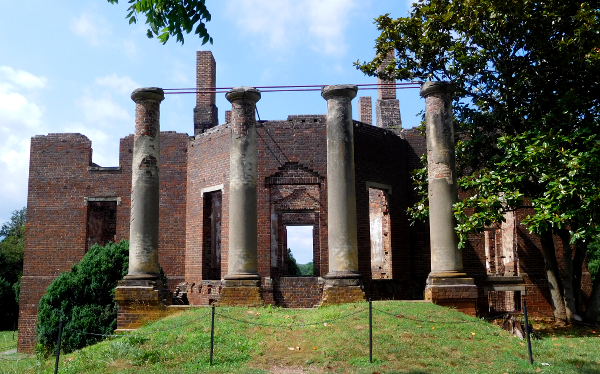
the mansion in Orange County once owned by Governor Barbour, and designed by Thomas Jefferson, burned on Christmas Day in 1884
On-Your-Own Field Trip Reports:
Visit your approved site six times in person. Submit six On-Your-Own Field Trip Reports on different aspects of the site’s physical and cultural geography, which will be assigned for each report. Submissions should include current photos, as well as your narrative.
Maps of the site are essential for this geography class. If you are familiar with GIS technology, feel free to use it - but maps could also be as simple as a pen-and-ink sketch which you photograph with your phone.
You will get feedback on your reports. Prepare to revise your first submissions based on that feedback, and use them later to create a Final Portfolio about the site your chose.
A model of an On-Your-Own Field Trip Report will be provided at http://www.virginiaplaces.org/ggs380/
There will be six On-Your-Own Field Trip Reports. Each is worth up to 20 points. The lowest grade will be discarded, and the top five grades will count towards your final grade.
Virtual Tour:
You will prepare a 10-stop tour of a location separate from the one chosen for On-Your-Own Field Trip Reports and the Final Portfolio. Tour distance may vary from a few miles to crossing the entire state, but should cross at least one city and/or county boundary.
Descriptions of tour stops should incorporate a range of physical and cultural characteristics, such as distinctive local geology and hydrography, changes in population over time, major local employers, etc. When discussing local historic events at that site, elaborate on geographic factors that affected what happened there.
You can use ESRI’s StoryMap tool, Google’s TourBuilder, or simply create a document and insert pictures/maps/coordinates to create a virtual tour. A model of a Virtual Tour will be provided at http://www.virginiaplaces.org/ggs380/
The Virtual Tour is worth up to 50 points.
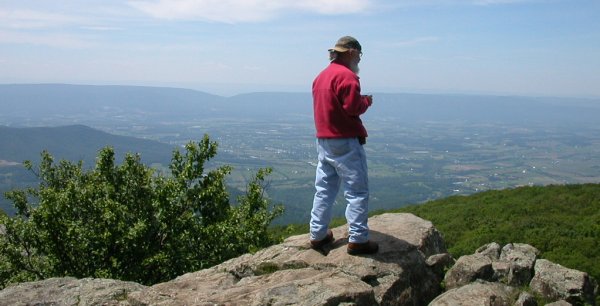
Looking west at Page Valley from near Big Meadows, on Skyline Drive
Final Portfolio:
The Final Portfolio is a “deep dive” into one place, from the ground up to the historical/cultural character of the place. The portfolio is compiled from the On-Your-Own Field Trip Reports submitted throughout the semester, and must address feedback provided on those reports.
A model of a portfolio will be provided at http://www.virginiaplaces.org/ggs380/
Final Exam:
The Final Exam is cumulative. Material covered throughout the semester will appear in questions. As in the Online Exams, critical thinking and analytical skills will be required.
The exam will be posted on a Friday and is due by midnight on the following Monday. The Final Exam is worth up to 150 points.
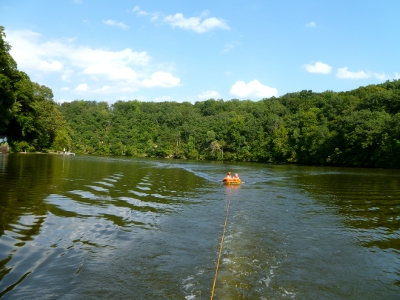
summertime fun on Lake Jackson (Prince William County)
EXTRA CREDIT
There are two ways to earn extra credit. You can earn up to 200 additional points from extra credit assignments.
Guided Tour Reports:
Three guided tours are scheduled throughout the semester. If you have visited a national park and went on a ranger-led tour, then you know what to expect.
We will explore the Alexandria waterfront, Manassas Battlefield, and Clarendon. The three-hour tours will examine all geographical characteristics of the places, including physical and cultural geography. Expect about 1-2 miles of walking around. We will examine why these three places are unique, how they evolved, and how they may change in the next 50 years.
A model of a Guided Tour Report will be provided at http://www.virginiaplaces.org/ggs380/
If you come on the guided tour and then submit a report within the next week, you can earn up to 50 extra points. Three tours and three reports can earn you as much as 150 points.

Silver Line extension of Metrorail under construction at Tysons Corner (Fairfax County)
Museum/Historic Site Reports:
In addition to taking a guided tour, you can visit a museum or historic site within Virginia and then submit a report. Spend at least 20 minutes exploring the site, then write a report based on a format to be provided.
A model of a Museum/Historic Site Report will be provided at http://www.virginiaplaces.org/ggs380/
Get authorization first before visiting a site, to ensure you can earn up to 10 points with each report. A site may be anywhere within Virginia. Some possible places within an easy day’s drive of GMU include:
- Aldie Mill
- Alexandria Black History Museum
- Alexandria History Museum at The Lyceum
- Arlington Historical Museum
- Ball-Sellers House
- Carlyle House
- Colvin Run Mill
- Fairfax Museum and Visitor Center
- Fauquier History Museum at the Old Jail
- Gunston Hall
- Historic Blenheim and the Civil War Interpretive Center
- Loudoun Museum
- Luray Caverns
- Mill House Museum
- Mount Vernon
- Stratford Hall
- Sully Historic Site
- Weems-Botts Museum
- Workhouse Prison Museum at Lorton
See other learning opportunities at:
- Department of Geography and Geoinformation Science
George Mason University celebrates diversity and strives to have faculty, staff and students that reflect the diversity of our plural society. We do not discriminate on the basis of race, class, linguistic background, religion, gender identity, sex, sexual orientation, ethnicity, age, or physical ability.